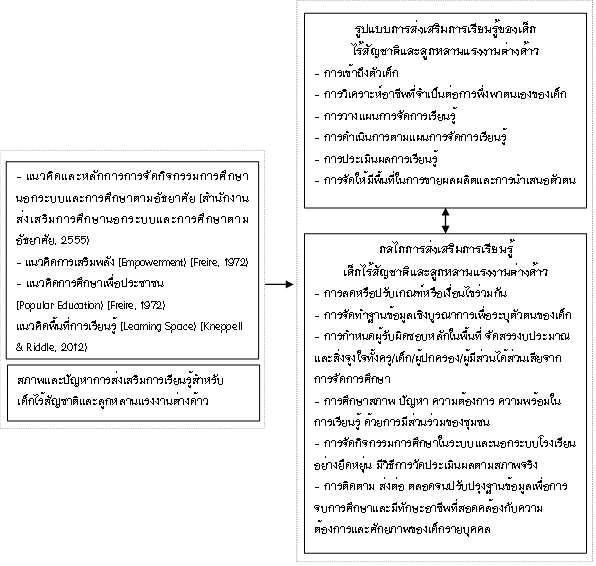การส่งเสริมการเรียนรู้และกลไกสนับสนุนการเรียนรู้ สำหรับเด็กไร้สัญชาติและลูกหลานแรงงานต่างด้าว
Main Article Content
บทคัดย่อ
การวิจัยนี้มีวัตถุประสงค์เพื่อศึกษาสภาพและปัญหาการส่งเสริมการเรียนรู้สำหรับเด็กไร้สัญชาติและลูกหลานแรงงานต่างด้าว และสังเคราะห์รูปแบบและกลไกการส่งเสริมการเรียนรู้ของเด็กไร้สัญชาติและลูกหลานแรงงานต่างด้าว ผู้ให้ข้อมูลสำคัญ คือ ครูนอกระบบการศึกษา นักวิชาการ และผู้เกี่ยวข้องกับการส่งเสริมการเรียนรู้สำหรับเด็กไร้สัญชาติและลูกหลานแรงงานต่างด้าว ได้มาด้วยการเลือกเจาะจง เครื่องมือที่ใช้ในการวิจัย คือ แบบศึกษาเอกสาร แบบสัมภาษณ์ แบบสังเกตแบบสังเกตอย่างมีส่วนร่วม และแนวทางการสนทนากลุ่ม วิเคราะห์ข้อมูลด้วยการวิเคราะห์เนื้อหาและการวิเคราะห์แบบอุปนัย ตรวจสอบความถูกต้องของการวิเคราะห์ข้อมูลด้วยการตรวจสอบข้อมูลแบบสามเส้าด้านวิธีการเก็บรวบรวมข้อมูล
ผลการวิจัย พบว่า 1) สภาพการส่งเสริมการเรียนรู้สำหรับเด็กไร้สัญชาติและลูกหลานแรงงานต่างด้าวภาครัฐและภาคเอกชนมีการส่งเสริมการเรียนรู้ทั้งในระบบและนอกระบบโรงเรียนในรูปแบบศูนย์การเรียนและบ้านเรียนแก่เด็กไร้สัญชาติและลูกหลานแรงงานต่างด้าวโดยดำเนินการมาอย่างต่อเนื่อง แต่ยังพบปัญหาทัศนคติชาติพันธุ์นิยม เงื่อนไขด้านภาษาและอายุ รวมถึงการขาดแคลนครูที่เป็นอุปสรรคทำให้การดำเนินงานไม่สำเร็จเท่าที่ควร 2) รูปแบบการส่งเสริมการเรียนรู้ของเด็กไร้สัญชาติและลูกหลานแรงงานต่างด้าว ประกอบด้วย 6 องค์ประกอบ คือ การเข้าถึงตัวเด็ก การวิเคราะห์อาชีพที่จำเป็นต่อการพึ่งพาตนเองของเด็ก การวางแผนการจัดการเรียนรู้ การดำเนินการตามแผนการจัดการเรียนรู้ การประเมินผลการเรียนรู้ และการจัดให้มีพื้นที่ในการขายผลผลิตและการนำเสนอตัวตน สำหรับกลไกส่งเสริมการเรียนรู้ของเด็กไร้สัญชาติและลูกหลานแรงงานต่างด้าว ประกอบด้วย 6 กลไกเกื้อหนุนเสริมการดำเนินงาน คือ การลดหรือปรับเกณฑ์หรือเงื่อนไขร่วมกัน การจัดทำฐานข้อมูลเชิงบูรณาการเพื่อระบุตัวตนของเด็ก การกำหนดผู้รับผิดชอบหลักในพื้นที่ จัดสรรงบประมาณ และสิ่งจูงใจทั้งครู/เด็ก/ผู้ปกครอง/ผู้มีส่วนได้ส่วนเสียจากการจัดการศึกษา การศึกษาสภาพ ปัญหา ความต้องการ ความพร้อมในการเรียนรู้ ด้วยการมีส่วนร่วมของชุมชน การจัดกิจกรรมการศึกษาในระบบและนอกระบบโรงเรียนอย่างยืดหยุ่น มีวิธีการวัดประเมินผลตามสภาพจริง และการติดตาม ส่งต่อ ตลอดจนปรับปรุงฐานข้อมูลเพื่อการจบการศึกษาและมีทักษะอาชีพที่สอดคล้องกับความต้องการและศักยภาพของเด็กรายบุคคล
Downloads
Article Details

อนุญาตภายใต้เงื่อนไข Creative Commons Attribution-NonCommercial-NoDerivatives 4.0 International License.
เอกสารอ้างอิง
จรีพร นาคสัมฤทธิ์. (2562). รูปแบบการจัดการศึกษา “โรงเรียนสัมมาชีพ” สำหรับเด็กกลุ่มชาติพันธุ์บนพื้นที่สูง: กรณีศึกษาโรงเรียนสาธิตสังกัดมหาวิทยาลัยศรีนครินทรวิโรฒ แม่แจ่ม เชียงใหม่. วารสารครุศาสตร์ จุฬาลงกรณ์มหาวิทยาลัย, 47(2), 1-17.
บูชิตา สังข์แก้ว พันธรักษ์ ผูกพันธุ์ และดำรงพล อินทร์จันทร์. (2562). ตัวแบบการพัฒนานโยบายการจัดการศึกษาปฐมวัยสำหรับเด็กกลุ่มชาติพันธุ์เพื่อการสร้างความยุติธรรมทางสังคม กรณีศึกษาพื้นที่เขตพัฒนาเศรษฐกิจพิเศษ จังหวัดตากและจังหวัดตราด. วารสารพัฒนาสังคม. 21(2), 96-118.
วสันต์ ปวนปันวงศ์. (2561). สิทธิการศึกษาของเด็กไร้สัญชาติ กรณีศึกษาโรงเรียนบ้านโป่งน้อย อำเภอเมือง จังหวัดเชียงใหม่. วารสารรัฐศาสตร์และรัฐประศาสนศาสตร์, 9(2), 123-156.
สำนักงานเลขาธิการสภาการศึกษา. (2561). รายงานการจัดการศึกษาสำหรับเด็กที่ไม่มีสัญชาติไทยและบุตรหลานแรงงานข้ามชาติในประเทศไทย. กรุงเทพฯ: พริกหวานกราฟฟิค.
สำนักงานส่งเสริมการศึกษานอกระบบและการศึกษาตามอัธยาศัย. (2555). คู่มือการดำเนินงานหลักสูตรการศึกษานอกระบบระดับการศึกษาขั้นพื้นฐาน พุทธศักราช 2551 (ฉบับปรับปรุง พุทธศักราช 2555). กรุงเทพฯ: รังสีการพิมพ์.
องค์การยูนิเซฟ ประเทศไทย. (2563). ชีวิตที่ไม่มีใครเห็น: 48 ปี สถานการณ์เด็กไร้สัญชาติในประเทศไทย (2515-2563). กรุงเทพฯ: องค์การยูนิเซฟ ประเทศไทย.
อัสซูวรรณ เปาะหะ. (2560). ปัญหาการเข้าถึงสิทธิทางการศึกษาของคนไร้รัฐไร้สัญชาติ กรณีศึกษา: บ้านห้วยหยวกป่าโซ ตำบลแม่สลองใน อำเภอแม่ฟ้าหลวง จังหวัดเชียงราย. (การวิจัยเฉพาะเรื่องปริญญาประกาศนียบัตรบัณฑิต, สาขาวิชาบัณฑิตอาสาสมัคร มหาวิทยาลัยธรรมศาสตร์).
Freire, P. (1972). Pedagogy of the oppressed. Harmondsworth: Penguin.
Kenan Foundation Asia. (2020). 3 consequences of COVID-19 on Thai Education. สืบค้นจาก https://www.kenan-asia.org/covid-19-thai-education/
Kneppell, M. & Riddle, M. (2012). Distributed learning spaces: Physical, blended and virtual learning spaces in higher education. In Keppell, M., Souter, K, & Riddle, M. Physical and virtual learning spaces in higher education: Concepts for the modern learning environment. (pp.1-21). PA: Information Science Reference.
UNESCO. (2020). Education and Covid-19. สืบค้นจาก https://bangkok.unesco.org/index.php/content/education-and-covid-19
Wattanasukchai, S. (2020). Vulnerable and struggling: Society’s poorest families suffering through COVID-19. สืบค้นจาก https://www.unicef.org/thailand/stories/vulnerable-and-struggling-societys-poorest-families-suffering-through-covid-19


